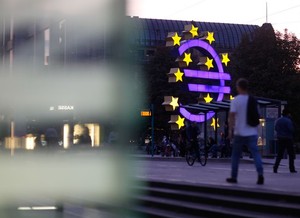The Eurozone that re-emerges next year might be unrecognizable compared to the one we know today.
That’s according to a report out from PwC today which outlines 4 possible scenarios for Europe in the aftermath of the debt crisis.
“Expect surprises next year. We are currently experiencing unprecedented levels of uncertainty in the Eurozone. The potential political and economic outcomes emerging from the Eurozone crisis in 2012 are disparate, although all share a similar theme. A harsh adjustment to a new fiscal unavoidable, regardless of the path politicians finally decide to follow,” PwC says.
The report notes that there are significant tranches of sovereign debt coming due for refinancing in early Spring. That plus growing market pressure leads PwC to believe that resolution in the Eurozone will be announced in the first quarter of 2012.
Among 4 possibilities the accounting firm lays out: an entirely new currency bloc that includes Europe’s stronger nations like Germany, France, Netherlands and Finland.
What would such an overhaul mean for nations that are essentially kicked out? PwC explains the outcome although without much in the form of quantatative impact:
Countries that exited the euro and were not part of the new bloc would face similar challenges to Greece in scenario 3. As each country exits the euro, their new currency would swiftly depreciate. These countries would then face the long hard challenge of individually reconstructing credible fiscal and monetary institutions and establishing credible new currencies. The success or failure of each country would depend on the choices that their leaders and citizens make. All would suffer in the short-term as they adjust to a weaker currency, higher interest rates and fiscal contractions. In the long-term some countries would thrive in a low cost exporting environment unconstrained by a strong currency, while others would not do so well.
For the U.S., a new eurozone currency bloc would mean a drop in exports as well as banking sector problems, PwC says but notes that it may mean an increase in capital inflows as investors seeks safe havens. According to the firm, trades in goods and service makes up 15% of the U.S. economy “so the reduction in trade, on account of dollar appreciation, will have some negative effect on the US economy.”
Here are all 4 possible scenarios below or click here to see the full report for more:
Monetary expansion. A concerted programme of monetary expansion by the ECB, with support from the European Financial Stability Facility (EFSF), boosts nominal growth to contain the crisis.
Orderly defaults. Vulnerable economies restructure debt through voluntary defaults to bring debt levels under control.
Greek exit. Greece exits the currency union and the rest of the Eurozone commits to protecting the remaining members.
New currency bloc. Core countries propose a new-euro bloc with integrated fiscal and monetary institutions. Vulnerable economies exit the euro. The European debt crisis has been a major handicap to the overall economic recovery. The market’s day to day swings have been heavily influenced by debt crisis news coming out of Europe and a lack of a real resolution to the problems which have already resulted in bailouts of Ireland, Greece and Portugal.
Earlier today it was reported that the debt crisis could result in a credit downgrade of AAA rated nations including Germany, France, Austria, Finland, the Netherlands and Luxembourgh.
The U.S. banking sector is also at risk if the situation in Europe worsens. Last month the ratings agency Fitch said the U.S. banking industry could lose its stable outlook saying that “Unless the eurozone debt crisis is resolved in a timely and orderly manner, the broad outlook for U.S. banks will darken…The risks of a negative shock are rising and could alter Fitch’s stable rating outlook for U.S. banks.”
Last week S&P downgraded Bank of America, Citigroup, Morgan Stanley, Goldman Sachs, Wells Fargo, JPMorgan Chase, Bank of New York Mellon as part of an overhaul of its ratings methodology. 2011 Forbes.com LLC™ All Rights Reserved
See online: 4 Possible Outcomes For The Eurozone In 2012

